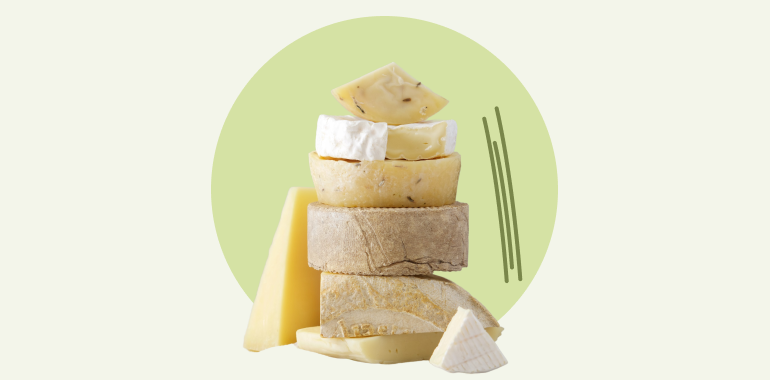Table Of Contents
Is Cheese Good for Weight Loss? A Dietitian’s Perspective
Cheese lovers rejoice! Contrary to popular diet myths, you don’t need to eliminate cheese from your eating plan to shed pounds. In fact, certain types of cheese can support your weight loss goals when consumed in moderation. With over 1,800 varieties worldwide, cheese offers essential nutrients like protein, calcium, and vitamins that can benefit your health while satisfying your cravings.
Let’s explore which cheeses deserve a place in your weight management strategy and which ones might sabotage your progress. I’ll break down the nutritional profiles of popular cheeses and provide practical guidance for incorporating them into a healthy diet.
The Weight Loss Benefits of Cheese
When chosen wisely, cheese can be a valuable addition to your weight loss plan. High-quality cheese provides satiety-promoting protein and calcium, which helps control hunger between meals. Research suggests that calcium may play a role in fat metabolism, potentially enhancing your body’s ability to burn fat.
The protein content in cheese helps preserve lean muscle mass during weight loss, which is crucial for maintaining a healthy metabolic rate. Plus, cheese’s rich flavor profile can make healthy meals more satisfying, reducing the likelihood you’ll reach for less nutritious options later.
Mozzarella Cheese: A Weight Loss Friendly Option
Is mozzarella cheese healthy for weight loss? Absolutely! As America’s most popular cheese according to the USDA’s Economic Research Service, mozzarella offers impressive nutritional benefits for weight-conscious individuals. Low-moisture, part-skim mozzarella provides substantial protein with relatively low calories compared to other cheese varieties.
Just one ounce of skim mozzarella cheese delivers:
- High protein content (approximately 7g per ounce) for increased satiety
- Low carbohydrates (less than 1g per ounce)
- Rich in calcium (222mg per ounce)
- Excellent source of Biotin (Vitamin B7)
- Lower fat content compared to many other cheeses
Mozzarella cheese good for weight loss because it provides essential nutrients without excessive calories. The high protein content helps you feel fuller longer, while its low carbohydrate profile makes it suitable for low-carb eating plans. Biotin (Vitamin B7) supports proper metabolic function, which is crucial during weight loss.
Fresh mozzarella has a mild, creamy flavor that pairs beautifully with tomatoes, basil, and olive oil for a satisfying salad. Shredded part-skim mozzarella works perfectly as a protein-rich topping for homemade pizzas with whole grain crusts and plenty of vegetables.
Best Cheeses for Weight Management
Cottage Cheese: The Protein Powerhouse
Cottage cheese has long been a staple in weight loss diets, and for good reason. This versatile cheese provides exceptional protein-to-calorie ratio, making it an ideal choice for anyone looking to shed pounds while preserving muscle mass.
Here’s why cottage cheese deserves a spot in your weight loss plan:
- High protein content increases satiety and reduces overall calorie intake
- Low calorie option compared to many other cheeses
- Rich source of calcium (18% DV per cup)
- Helps reduce unhealthy snacking between meals
Studies have found that consuming protein-rich foods like cottage cheese is associated with increased levels of satiety and significant reductions in total calorie intake compared to lower-protein alternatives. This makes cottage cheese a smart choice for controlling hunger while meeting your nutritional needs during weight loss.
Feta Cheese: Flavorful and Figure-Friendly
Feta cheese, traditionally made from sheep’s or goat’s milk, packs a flavorful punch that can enhance meals without adding excessive calories. Its strong, tangy taste means a little goes a long way, helping you control portions naturally.
Key benefits of feta cheese for weight loss include:
- Contains conjugated linoleic acid (CLA) that may help reduce body fat
- Rich in calcium and phosphorus for bone health
- Strong flavor means you need less to satisfy taste buds
- Provides B vitamins that support energy and metabolism
Feta cheese contains a unique type of fatty acid called conjugated linoleic acid (CLA), which research suggests may help reduce body fat and improve body composition over time. This makes feta an excellent addition to salads, omelets, and Mediterranean-inspired dishes while supporting your weight management goals.
Ricotta Cheese: Versatile and Nutritious
Ricotta cheese, a soft Italian cheese made from whey protein, offers impressive nutritional versatility for weight-conscious individuals. Its mild flavor and creamy texture make it adaptable for both savory and sweet dishes.
Ricotta’s weight loss benefits include:
- Promotes weight loss with low carb content
- Helps build lean muscle mass through quality protein
- Contains anti-inflammatory properties
- Rich in vitamin B12 for metabolism boost
Half a cup (124g) of whole-milk ricotta provides about 9g of protein and 9g of carbs, making it suitable for those following lower-carb eating plans. The anti-inflammatory properties of ricotta may help reduce inflammation in the body, which can support weight loss efforts. Additionally, ricotta’s vitamin B12 content helps boost metabolism and prevent fat accumulation.
Blue Cheese: Nutrient-Dense Option
Blue cheese offers a distinct flavor profile and impressive nutritional benefits that can support weight management. This nutrient-dense cheese provides significant calcium and protein while adding bold flavor to meals and snacks.
According to the USDA, a 1-ounce serving (28 grams) of blue cheese contains:
- 100 calories
- 8.1g fat
- 6.1g protein
- 0.7g carbohydrates
- 150mg calcium
Blue cheese stands out for its:
- Higher calcium content than many cheeses (150mg per ounce)
- Contains spermidine which may improve cardiovascular health
- Virtually lactose-free, making it suitable for those with mild lactose sensitivity
- Naturally gluten-free
Blue cheese contains spermidine, a compound that may slow aging and reduce cardiovascular disease risk. This may partly explain the “French paradox,” where fewer people die of cardiovascular disease in France despite consuming more saturated fat on average. Its strong flavor means you can use small amounts to add significant taste to your meals.
Cheeses to Limit When Losing Weight
American Cheese
When focusing on weight loss, American cheese should be one of the first items to limit or eliminate from your diet. This highly processed product often contains minimal nutritional value while being loaded with artificial ingredients and preservatives. Unlike natural cheeses that provide calcium and essential vitamins, American cheese offers little nutritional benefit to justify its calorie content.
For better alternatives, choose natural cheeses like mozzarella or cottage cheese that provide more protein and calcium per calorie. These substitutes will satisfy your cheese cravings while supporting your weight loss goals more effectively.
Cheddar Cheese
While cheddar cheese offers great flavor and some nutritional benefits, its high fat content makes it a less-than-ideal choice for weight loss. With approximately 30g of fat per 100g, cheddar packs a significant caloric punch that can quickly derail your calorie deficit. Additionally, cheddar tends to be high in sodium and cholesterol, which may affect overall health when consumed in large amounts.
If you can’t resist the distinctive taste of cheddar, opt for reduced-fat versions and practice strict portion control. Using a food scale can help ensure you’re not accidentally consuming more than you intended. Alternatively, try sharp varieties where a smaller amount can deliver the flavor you crave with fewer calories.
Is Cream Cheese Suitable for Weight Loss?
Cream cheese presents a mixed picture for those trying to lose weight. Made from either cream or a combination of cream and milk, it contains beneficial lactic acid bacteria that may support digestive health. It’s also a good source of vitamin A and antioxidants, and is relatively low in lactose, making it suitable for those with mild lactose sensitivity.
According to the USDA, a single ounce of cream cheese provides:
- 84 calories
- 8 grams of fat
- 1 gram of carbs
- 2 grams of protein
While cream cheese can fit into a low-carb eating plan, its high calorie-to-protein ratio makes it less ideal for weight loss compared to other cheese options. If you enjoy cream cheese, choose light versions and control portions carefully. Spread a thin layer on high-fiber crackers or use it sparingly as a dip base mixed with Greek yogurt for a more protein-rich alternative.
Parmesan Cheese: Use Sparingly

Parmesan cheese has earned recognition in Europe as a functional food due to its impressive nutritional profile. It’s an excellent source of calcium and protein, which support fat metabolism and muscle maintenance during weight loss. Despite being a dairy product, Parmesan is naturally lactose-free, making it suitable for those with lactose intolerance.
Parmesan provides several valuable nutrients:
- Excellent source of calcium and protein
- Naturally lactose-free
- Contains phosphorus for bone health
- Provides approximately 335 mg of calcium per ounce (26% DV)
However, Parmesan is also calorie-dense, which means portion control is essential. Its intense flavor works to your advantage—a small amount grated over vegetables or whole grain pasta can add significant taste without excessive calories. Use a microplane grater to create a fine, fluffy texture that appears to be more cheese while using less.
Mac and Cheese: A Weight Loss Obstacle
While many cheese varieties can support weight loss goals, traditional mac and cheese presents significant challenges. This beloved comfort food typically contains high levels of saturated fats and sodium from butter, cheese, and whole milk. These factors combine to create a calorie-dense dish that can easily sabotage weight loss efforts.
If you can’t resist the occasional mac and cheese craving, consider these strategies:
- Practice strict portion control—treat it as a side dish rather than a main course
- Make healthier versions using reduced-fat cheese, whole grain pasta, and added vegetables
- Use butternut squash or cauliflower to create creamy texture with fewer calories
- Boost protein content with Greek yogurt in place of some cheese
The occasional small serving of mac and cheese won’t derail your entire weight loss journey, but making it a regular meal choice will likely slow your progress. Focus on creating a sustainable eating pattern that includes more nutrient-dense cheese options in appropriate portions.
Also, read – Is Kombucha Good For Weight Loss
Final Thoughts on Cheese and Weight Loss
Contrary to popular belief, you don’t need to ban cheese from your diet to lose weight. When chosen wisely and consumed in appropriate portions, cheese can support your weight loss journey while providing essential nutrients. The protein in cheese helps preserve muscle mass during weight loss, while calcium may enhance fat metabolism.
For the best results, focus on lower-fat options like cottage cheese, part-skim mozzarella, feta, and ricotta. These varieties offer more protein per calorie and tend to be lower in saturated fat than options like cheddar or processed American cheese. Use stronger-flavored cheeses like Parmesan or blue cheese in small amounts to add flavor without excessive calories.
Remember that portion control remains critical with all cheese varieties. Measure your portions using a food scale or pre-portioned servings to avoid accidentally consuming more calories than intended. By making smart cheese choices and practicing moderation, you can enjoy this delicious food group while still achieving your weight loss goals.
My name is Barbara Kovalenko. I hold a Bachelor's degree in Human Nutrition from Bogomolets National Medical University in Ukraine and a Master's degree from Boston University in the United States. Over the past few years, I have gained valuable experience as a nutritionist and have since decided to share my knowledge and expertise with a wider audience. Currently, I am working as a nutritional consultant with the Lasta app.










A lot of useful information. but still, what is the best cheese for weight loss?
Hi, Rose!
When considering weight loss, opting for low-fat and protein-rich cheeses like cottage cheese or feta can be a good choice. 🧀